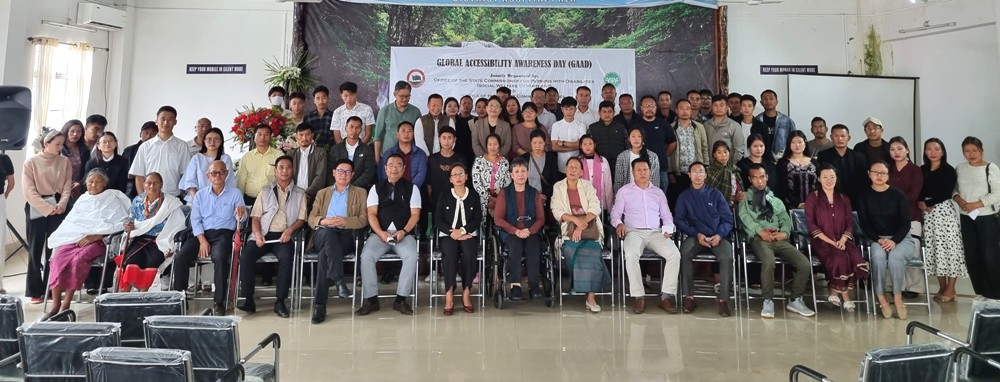THURSDAY, MAY 22, 2025
- Home
- Accessibility key to inclusion, says Diethono Nakhro in Phek
Accessibility key to inclusion, says Diethono Nakhro in Phek
Published on May 19, 2025
By EMN
Share

Diethono Nakhro, Zhoi Lohe, Zapuno Sophie and others during the event on May 15 in Phek.
- KOHIMA — The Global Accessible Awareness Day (GAAD) 2025 was observed on May 15 in Phek district on the theme “Design for everyone: accessibility is empowerment”. The event was held at Dr. Wethselo T Memorial Hall, District Hospital Phek.
- The event was jointly organised by the Office of the State Commissioner for Persons with Disabilities (SCPD), the Department of Social Welfare, and the Office of the Deputy Commissioner, Phek, according to a press release from the SCPD office.
- It highlighted the importance of accessibility and inclusive design in empowering persons with disabilities and creating equitable opportunities for all members of society.
- Delivering the keynote address, Diethono Nakhro, former State Commissioner for Persons with Disabilities, stated that accessibility is a human right, as clearly outlined in the United Nations Convention on the Rights of Persons with Disabilities (UNCRPD). India, as a signatory to the UNCRPD, reinforces this through the Rights of Persons with Disabilities (RPwD) Act.
- Nakhro stated that accessibility removes barriers and added that it is not just about law but about people. She emphasised that accessibility involves removing barriers and unlocking opportunities for those who are hindered by them.
- She said that disabled people are like everyone else, with dreams, goals, desires, and plans, and many things they want to try and do. However, she noted that the difference between disabled and non-disabled people is that the world is not built for disabled people, which often prevents them from having the opportunity to pursue what they are capable of.
- Speaking on education, she stated that children with disabilities, like all children, have ambitions and dreams for their future and need quality education to develop their skills and reach their potential. However, most children with disabilities are unable to get a proper education due to inaccessible buildings and classrooms, inaccessible textbooks and curriculum, and untrained teachers.
- Despite many laws and provisions in the country to ensure education for all, children with disabilities continue to be left out because our education system is not fully accessible, she said, stressing again that accessibility is vital.
- “Words like ‘inclusive’ and ‘inclusion’ are very fashionable these days — we hear it in speeches by politicians, leaders, and officials — but without active effort and action on accessibility, there can be no inclusion. Groups like persons with disabilities will always be left behind and forgotten,” she cautioned.
- Dwelling on the RPwD Act 2016, which provides protection against discrimination and promotes equal opportunity and accessibility, she highlighted that the Act lays down provisions related to education, employment and livelihood, health, rehabilitation, sports, and social life for persons with disabilities.
- She emphasised that unless accessibility is considered in its full sense — including physical spaces, mindsets, digital platforms, communication, services, and policies — inclusion will never be achieved.
- Zapuno Sophie, Assistant Commissioner for Persons with Disabilities, conveyed that access to infrastructure is the first step towards creating a world of inclusion and that accessibility is empowerment.
- Zhoi Lohe, Additional Deputy Commissioner (ADC) of Phek, mentioned that this disability awareness programme was the first of its kind in the district. Throughout the programme, sign language interpretation was provided by Ruokuokhrienuo Vizotha.
Also read: Early intervention key to helping children with disabilities, say Experts

